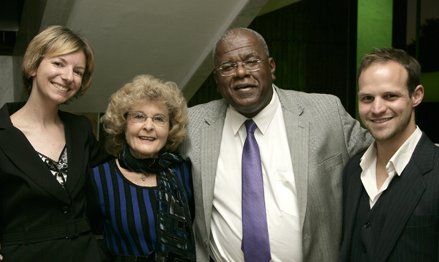Latest News Archive
Please select Category, Year, and then Month to display items
07 March 2018
Photo Supplied
 Ts’epang Sello, one of the Kovsie contenders for a medal at Friday’s Varsity athletics meeting.
Ts’epang Sello, one of the Kovsie contenders for a medal at Friday’s Varsity athletics meeting.
Ts’epang Sello, one of the Kovsie contenders
for a medal at Friday’s Varsity athletics meeting.
Photo: Supplied
The University of the Free State will hope to start developing their next Wayde van Niekerk when the first Varsity athletics meeting takes place on Friday at the Tuks Athletics Stadium in Pretoria.
The second meeting is on 23 March, also in Pretoria.
Thirteen members (five men and eight women) of the Kovsie team of 25 are still under the age of 21.
The hope for medals among the men would be on Sefako Mokhosoa (triple jump), Hendrik Maartens, and Tsebo Matsoso (both 200 m). Mokhosoa, who represented South Africa last year at the Southern Region Championships, is in red-hot form and achieved a personal best of 16.13 m at the Motheo/Xhariep meeting two weeks ago. This is currently the third best distance in the country for 2018.
Maartens would like to go one step further. In last year’s final Varsity meeting, he finished second in 20.62. Great things are expected of Matsoso, a first-year student who competed at the African Junior Championship in 2017. Last year, he was one of the top athletes at school level by winning the SA title in a time of 21.14.
Ts’epang Sello (800 m) and Elmé Smith (100 m and 200 m) will lead the charge for the women. Sello already came close to her personal best (2:09.8) this year, while Smith has also been running fast times. Her best this year was 11.88 (100 m) and 24.53 (200 m).
Tyler Beling (1 500 m) is another first-year student who is showing great potential. She obtained a fourth position at last weekend’s CAA Southern Region Cross-country Championships. Maryke Brits (100 m hurdles and long jump) is a possible medallist, despite running her first event for the year on Wednesday night.
The meeting starts at 17:15 and will be broadcast on SuperSport 5.
'England, the English and the problem of education in South Africa.’
2013-09-26
|
 |
Attending the lecture were, from the left: Dr Susan Brokensha, Senior Lecturer: Department of English; Prof Rosemary Gray, Professor Emeritus (Honorary Life Vice-President of the English Academy of Southern Africa); Prof Jonathan Jansen; and Dr Thinus Conradie, Lecturer: Department of English.
Photo: Johan Roux
26 September 2013 |
Prof Jonathan Jansen: Lecture
The university celebrated the life of one of South Africa's most renowned art critics, hosting the 2013 English Academy’s Percy Baneshik Memorial Lecture on the Bloemfontein Campus.
The keynote lecture was delivered by Prof Jonathan Jansen, Vice-Chancellor and Rector, who joined a distinguished list of speakers to have delivered the lecture. Presented annually by the English Academy of Southern Africa, an association dedicated to promoting the effective use of English as a dynamic language in Southern Africa, past speakers include Prof Es’kia Mphahlele, Prof Njabulo Ndebele, Dr Alan Paton and Prof Albie Sachs. The lecture is hosted at venues across the country and this year Bloemfontein paid tribute to Percy Baneshik.
In his speech Not even colonial born: England, the English and the problem of education in South Africa,' Prof Jansen addressed the dilemma of the politics of language in both school and university education today.
Talking about the dominance of English in schools, Prof Jansen said it is the language of choice because indigenous languages are so poorly taught. "Simply learning in your mother tongue is absolutely no guarantee of improved learning gains in school. The problem is not the language of instruction; it is the quality of teaching, the knowledge of curriculum and the stability of the school."
Prof Jansen told the audience in the CR Swart Hall that Afrikaans-exclusive, or even Afrikaans-dominant white schools represent a serious threat to race relations in South Africa. "You simply cannot prepare young people for dealing with the scars of our violent past without creating optimal opportunities in the educational environment for living and learning together."